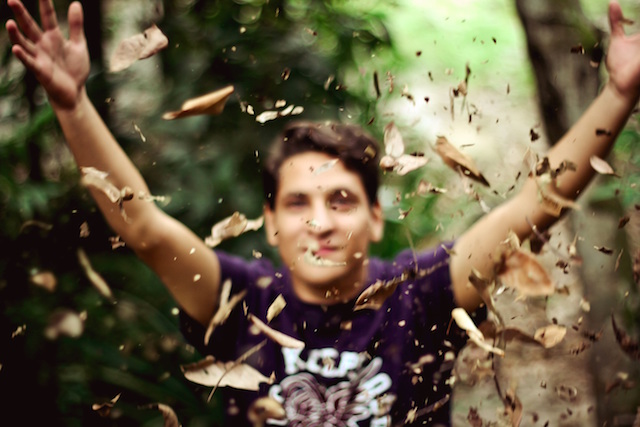The thing about wanting to change the way we are in the world, is that the way we are in the world changes.
We’re done with being mad at everyone, feeling depressed and feeling powerless about our lives. So we look for ways to change these aspects of our human existence.
We meditate, practice yoga, discover mindfulness and learn about spiritual ways of exploring the world inside and around us.
And we notice things start to change in our lives.
Our perceptions shift, and we start to have some amazing experiences of feeling happy and aligned with life itself.
However, the sh*t keeps hitting the fan.
We still struggle with getting along with our loved ones, understanding who we really are in the world and making choices both and small.
One of the most unexpected challenges of walking the mindful life path is we can no longer reach for our old coping mechanisms, which were once so comfortable.
It is interesting how we cling to what we know, even if it isn’t safe or good for us.
There are some old habits, formerly our usual coping mechanisms, which we can no longer rely on once we have realized that we are responsible for our own reality, and that the answer to healing the world is healing our own response patterns to the world.
Here are a few of those patterns that stop working for us:
Blame.
This one is really a toughie. In so many ways, blame feels good. We hate to be wrong. We hate to feel that we are deficient in some way. This is one reason we expel our pent-up energy by finding something or somebody to blame (and of course, this is often ourselves).
It can be so hard to accept that challenges are part of the human soul path. We want to think that if only other people, ourselves or the system as a whole would change, things could be alright. Blame is the opposite of mindfulness. It is getting caught up in the story of the mind versus just staying in the sensation of the body.
Once we become aware that there is no spiritual evolution in using blame as a way to cope with our challenges, it is no longer an option to us, which can be frustrating when we are feeling bad and want a quick solution.
Blame will bring us a quick way of feeling in control, but in the long run it won’t bring us the healing we really crave.
Keeping Busy.
I love this one. Just keep moving, don’t stop, and the bad, yucky feelings won’t catch up to us. I try to use this one all the time. I think most of us are employing it in some way, even if the busyness is just scrolling through Facebook. But we all know that under the busyness is a layer of discontent. This layer of discontent is where the juicy, fertile ground of healing lies.
Once we start to see this layer of discontent, keeping busy will no longer work. In many ways this is a real bummer. Our old friend busyness helped us through the hard stuff many times; it can be a sad day when we reach for busyness to numb the pain and it doesn’t work. But really, this is a gift. Why stay busy when we could be doing less and evolving more?
Pretending Everything is Okay.
Fake it ’til you make it doesn’t work that well when it comes to spiritual growth. Pretending everything is okay because we think staying positive is better than spreading negative vibes just supports repression. Repression is how we stay stuck in life patterns that no longer serve us. Repression is how we grow disease and ill-ease and never make the changes we really are looking for in our lives. Learning that sad is perfect, mad is just right and grief is necessary is an act of courage I know we can all do.
Giving, Giving, Giving to Everyone Else.
This is such a good one. The coping mechanism of taking care of everyone else and ignoring our own needs is a favorite dysfunctional patterns of mine that I would do almost anything not to have to give up. But I do have to give it up, for one simple reason: it isn’t working in my best interest. Through being a martyr I just get cranky, ignore my real life’s work and make the people around me feel bad through not empowering them to take care of their own needs. If we find ourselves excessively taking care of other people’s needs instead of caring for our own, it might be time to ask the question: What am I avoiding dealing with in my own life?
So, yes, with sadness and often frustration we have to bury the old ways of being and coping as we develop responsibility for our own soul growth and evolution.
It can be frustrating to feel upset and lost and go to reach for a coping mechanism and find that the old ways no longer work. It can feel empty and lonely not to be able to blame, keep busy, pretend everything is okay or give to everyone else.
But the good news is there are new ways we can approach our daily challenges, such as:
Slowing Down.
Why are we always rushing around? Sometimes our speed alone lends to feeling stressed and harried. From this fast pace we often can’t think clearly or make good decisions that really reflect who we are and who we want to be.
I find a slow walk really puts things into perspective. Maybe at the beginning of the walk I notice I am trying to find blame or pretend everything is okay. But as my body settles into a steady rhythm and my mind resonates with the environment around me my consciousness goes deeper, and I start to feel who I am under the mind chatter. And I notice there is a quieter voice under the craziness that wants the best for me.
It is hard to tap into this inner wisdom without moving slower.
Being Willing to Feel Bad for the Greater Good.
The rush to feel better is a real mistake most of us make all the time. We feel bad, sad or mad, and we just want it to be better. That is why we reach for a screen to watch, or a drug or alcohol to ingest or something to eat. Anything to give relief to feeling bad.
But inside the place where we feel bad is the healing. Inside that deep hole of longing is where we end the deep hole of longing. It is counter-intuitive and hard to go into, because the resistance is strong. The current to not go into the hole is much greater than the compassionate knowing that inside the hole is where all the healing lies.
This takes time to understand.
Just know we don’t have to feel good to be moving in a good direction.
This willingness to feel bad for the sake of a greater goodness emerging is how we avoid the blame, staying busy, pretending we are okay and giving to others while we avoid ourselves.
It isn’t easy, but it works.
Compassion for Self and Everyone Involved.
Everything we do on this path needs to be infused with compassion. We are all on a difficult human journey, stumbling along hoping that we might fall in a good direction.
When we hurt, we need to see ourselves in the light of compassion.
When our hurt involves others, it is important to spread that compassion to all involved.
This is a work in progress.
Being Curious.
We don’t know the answers to anything, really. We can have ideas about things, but we can’t know anything for sure.
That is why it is so essential to stay curious.
Instead of being conclusive about our journey or where we are struggling, we can just wonder: What am I supposed to learn from this? Where is this part of the journey taking me?
We won’t get conclusive answers from these questions, but we often get wise guidance, even if that guidance is to stay patient and open.
The spiritual path is a path for the brave. We have to throw away all of our old ways of being and embrace the new each and every day.
It can surprise us when we find ourselves missing our old neurotic ways. This is when we need the compassion the most. Staying open to whatever comes our way asks us to be vulnerable—and often that comes with an increased sensitivity to our environment and shifting inner states.
Remembering that we are only trying to get closer to our own true inner state, which is also always changing, can help us take a deep breath and accept whatever is occurring with compassion, honesty and intention for healing.
~
Relephant Read:
Maybe the Only Thing to Do is Nothing.
~
Author: Ruth Lera
Editor: Toby Israel
Image: Matt Evan/Unsplash
~
 Share on bsky
Share on bsky






Read 2 comments and reply